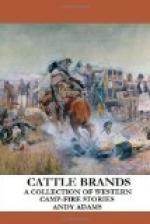“As she advanced, she called him by some pet name in their language, when he answered her gruffly, accusing her of treachery, and turned his back upon her. She approached within a few feet, when it was noticeable that she was racked with emotion, and asked him if he had no kind word for her. Turning on her, he repeated the accusation of treachery, and applied a vile expression to her. That moment the girl flashed into a fiend, and throwing a shawl from her shoulders, revealed a pistol, firing it twice before a man could stop her. El Lobo sank in his tracks, and she begged us to let her trample his lifeless body. Later, when composed, she told us that we had not used her any more than she had used us, in bringing him helpless to her. As things turned out it looked that way.
“We lashed the dead thief on his horse and rode until daybreak, when we buried him. We could have gotten a big reward for him dead or alive, and we had the evidence of his death, but the manner in which we got it made it undesirable. El Lobo was missed, but the manner of his going was a secret of four men and a Mexican girl. The other two prisoners went over the road, and we even reported to them that he had attempted to strangle her, and we shot him to save her. Something had to be said.”
The smoking and yarning had ended. Darkness had settled over the camp but a short while, when every one was sound asleep. It must have been near midnight when a number of us were aroused by the same disturbance. The boys sat bolt upright and listened eagerly. We were used to being awakened by shots, and the cause of our sudden awakening was believed to be the same,—a shot. While the exchange of opinion was going the round, all anxiety on that point was dispelled by a second shot, the flash of which could be distinctly seen across the river below the ford.
As Dad stood up and answered it with a shrill whistle, every man reached for his carbine and flattened himself out on the ground. The whistle was answered, and shortly the splash of quite a cavalcade could be heard fording the river. Several times they halted, our fire having died out, and whistles were exchanged between them and Root. When they came within fifty yards of camp and their outlines could be distinguished against the sky line in the darkness, they were ordered to halt, and a dozen carbines clicked an accompaniment to the order.
“Who are you?” demanded Root.
“A detachment from Company M, Texas Rangers,” was the reply.
“If you are Rangers, give us a maxim of the service,” said Dad.
“Don’t wait for the other man to shoot first,” came the response.
“Ride in, that passes here,” was Dad’s greeting and welcome.
They were a detachment of fifteen men, and had ridden from the Pecos on the south, nearly the same distance which we had come. They had similar orders to ours, but were advised that they would meet our detachment at this ford. In less than an hour every man was asleep again, and quiet reigned in the Ranger camp at Comanche Ford on the Concho.




